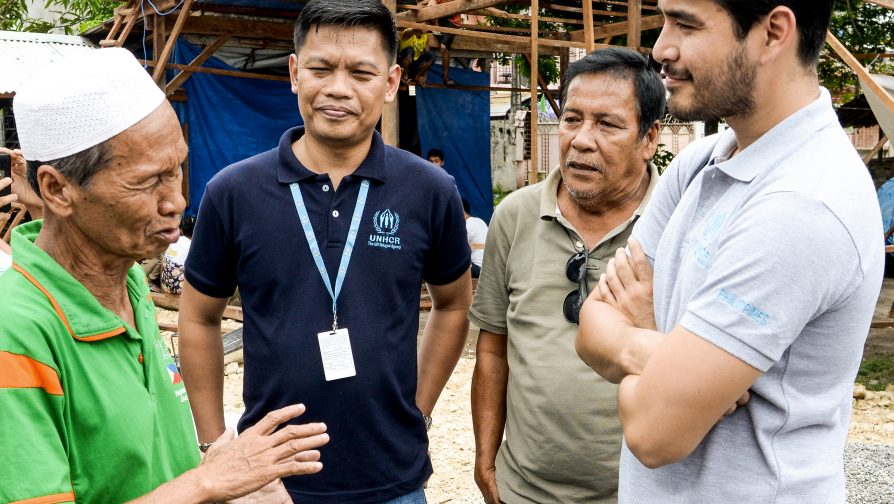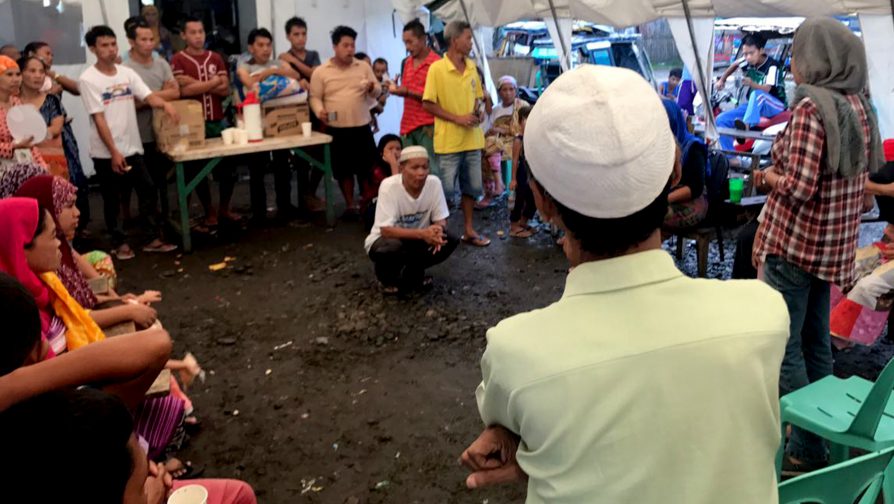An unsung hero opens doors to displaced Marawi families
With hundreds of thousands living in displacement due to armed conflict in Marawi, one teacher has opened his school to families seeking a safe place to call home.
“If I don’t take them in, who else will?” asked Ustadz Adbulkarim Ambor, a 59-year-old teacher who manages a madrasah (Arabic school) in Ceanuri Subdivision, located in the outskirts of Iligan City.
It has been more than two months since armed conflict erupted in Marawi City, forcing its people and residents from neighboring communities to escape hostilities. Some 40 kilometers from the conflict zone lies Mahad Al-Nor Al-Islamie, the madrasah that Ustadz Adbulkarim manages. When fighting broke out, Ustadz Abdulkarim opened the school to families in need of a place to stay.
Today, despite the facility’s limited resources, the school is home to 315 families or an estimated 1,500 persons. When the population started growing, Ustadz Adbulkarim also ended up offering his own home as a temporary refuge. The resources used to keep up with the needs of the internally displaced persons (IDPs) come from his own pocket.
The madrasah is among the 24 community-based evacuation centers that have sprouted in the aftermath of the conflict in Marawi. According to latest government reports, as many as 359,000 persons have been displaced due to the ongoing clashes.
A small percentage of the IDPs is scattered among 75 evacuation centers spanning 16 municipalities in Lanao del Norte and Lanao del Sur. The majority of them stay with family and friends as home-based IDPs. The rest live in community-based evacuation centers, such as the madrasah being run by Ustadz Abdulkarim.

UNHCR Advocate Atom Araullo meets Ustadz Abdulkarim Ambor (left), who heads the madrasah-turned-evacuation camp in Ceanuri Subdivision, Iligan City. (© UNHCR/V. Villafranca)
These community-based camps started as spontaneous settlements in nearby municipalities as fighting broke out in May this year. The collective centers, set up outside of the officially opened evacuation centers, are existing structures used for temporarily accommodating displaced populations.

As many as five families reside in cramped classrooms-turned-living quarters in this madrasah owned and managed by Ustadz Abudlkarim Ambor. (© UNHCR/V. Villafranca)
In this madrasah, living conditions are already at risk of deterioration: classrooms-turned-living quarters are packed to the brim while sanitation facilities are starting to break down.
Despite these constraints, Ustadz Adbulkarim continues to lend a helping hand and open his doors to those left most vulnerable by the conflict—an act that came with no hesitation and was for him like an initial instinct.
“He does this out of compassion and sympathy. He has always been generous,” shares Haifa, the teacher’s 22-year-old daughter.

Ustadz Abdulkarim Ambor (right) uses his own limited resources to manage the community-based evacuation camp. To augment his limited capacity, UNHCR advocates for the needs and protection of IDPs who found safety in this madrasah. (© UNHCR/M. Liquigan)
Offering Hope and Home
This is not the first time Ustadz Adbulkarim took in displaced families.
In 2008, he also hosted 63 families from Kauswagan, Lanao del Norte who fled their homes. In August that year, the harrowing image of civilians fleeing villages as rebels torched markets and set fire to government buildings was also prominent—not too far from the circumstances that arose from the Marawi crisis.

In the madrasah, the sound of children attending Sunday school offers a semblance of normalcy while living away from home. (© UNHCR/V. Villafranca)
Today, a choir of children sings prayers and hymns in Ustadz Adbulkarim’s madrasah. Despite the conditions there, Sunday school has resumed at a makeshift classroom in the remaining open space in the compound.
Ustadz Adbulkarim’s acts of generosity and goodwill serve as a reminder that amidst these turbulent times, those who may not have much may also be the ones who have a lot to give.
Indeed, it is not just a semblance of normalcy that Ustadz Adbulkarim has offered to the hundreds of families that found shelter in his home and his school; it is a sense of hope that even if they have left everything behind, there will be compassionate people standing in solidarity with them as they try to rebuild their lives.
You, too, can give the gift of hope today: https://donate.unhcr.ph/
